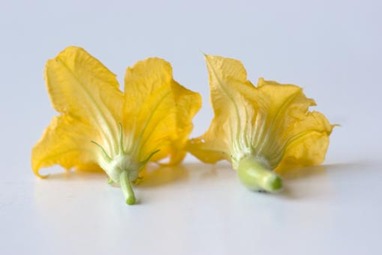 (image)
(image)
Let’s start with the first squash word you need to know: bounteous. If you plant zucchini (or any of zucchini’s summer squash brethren), you will be blessed with a bounteous harvest. So bounteous, in fact, that you may be driven to desperate measures to make use of this bounteousness. In Garrison Keillor’s Lake Wobegon, August is the one month people lock their cars, not for fear of their vehicles being stolen, but for fear that if they don’t, they’ll come out of church or the grocery store or the bank and find bags of zucchini in their backseats, left by zucchini gardeners like you, desperate to offload their bounty. So, just saying, plant zucchini, and you’ll get a lot, and it’ll just keep coming. But let’s assume you’re up for this kind of bounteous harvest. If that’s the case, there are a few more words you should know.
Bush habit. Although zucchini is closely related to winter squashes like pumpkins, it doesn’t have the same spreading vine habit. Instead, it has what is known as a “bush habit,” meaning, just as you might imagine, that it grows in more of a bush shape. That said, some bushes are more sprawling than others. For a limited-space city garden, you’ll probably want a variety of zucchini with more of a “closed bush habit.” A few “closed bush” varieties to consider: `Seneca Gourmet,’ `Blackee,’ and `Mexican Globe.'”
Next word: bloater. This one has a special place in my heart. I’m not sure it’s an official term, but back when I was a teenager picking zucchini for twenty cents a bucket plus cold cans of Shasta at the end of the day, “bloater” was the term we used for overgrown zucchinis. Because here’s the thing about zucchini: it’s gross when it gets too big. It gets fibrous. It gets watery. It gets flavorless. If you fill your bucket with bloaters, no Shasta for you. If you’re growing zucchini in your garden, you want to pick it when it’s small. Six or eight inches long, max. No bloaters. Or maybe just one as a science experiment, but that’s it.
There are a few more keywords related to when to plant, how to water, and which blossoms you should pick for squash blossoms and which you shouldn’t… Want to finish the vocabulary lesson? Click on through.
Tender. That’s the word for plants like zucchini that don’t like the cold. You have to plant them after warm weather is undeniably here to stay, and once frost hits in the fall, gone are the bounteous days. If you plant a zucchini crop in July or August, you can still harvest into the fall, provided you’re willing to move the container into your apartment on chilly nights.
Taproot. Zucchini plants have big root systems, including a taproot (think of a root that looks like a carrot) that can grow straight down into the soil three or more feet. This means you should plant your zucchini in a large container, otherwise the root system won’t be happy. This also means that zucchini plants don’t like being transplanted. Their roots are too likely to get messed up in the move. So your best bet is to grow them from seed, right in the container where you plan for them to spend their lives.
Thirsty. Zucchini plants like lots of water. Make sure the pot you plant them in has good drainage, then water, water, water. More water equals more zucchini. You’ll want to water deeply at least three times a week, in the heat of summer most likely daily.
Monoecious. Summer squashes have two kinds of flowers on each plant, male and female, which in botanical terms makes them “monoecious” (as opposed to dioecious, where female flowers grow on one plant and male on another). In the picture below, the male flower is on the left, the female on the right. You can tell them apart by looking at their stems, thin for the male blossom and thick for the female.
(image)
The female blossoms are the ones that develop into squash. The male blossoms provide the pollen. If you want to harvest squash blossoms but still want plenty of zucchini, pick male blossoms, though make sure to leave a few for the bees to visit. On the other hand, should you be interested in reducing your bounteous zucchini harvest, pick a few females.
Have questions I didn’t answer? Shoot me a message! spadespatula@gmail.com. Happy Growing!
Tags: squash, summer squash, zucchini
Great tips. Our zucchini fell victim to some sort of fungus and kept rotting. New shoots would pop out, grow vigorously for a week or two, then all of a sudden just droop over and rot. Better luck next year, hopefully.